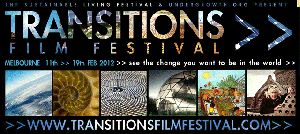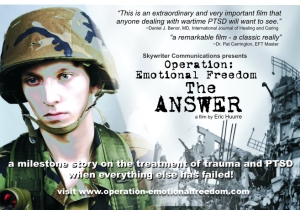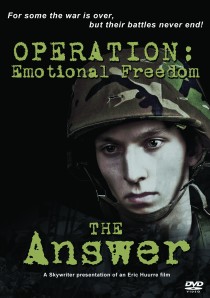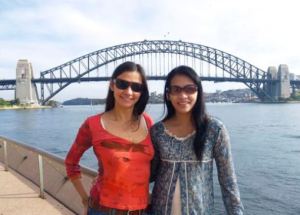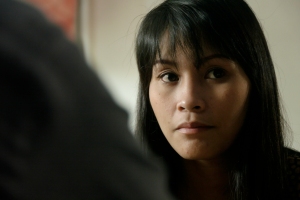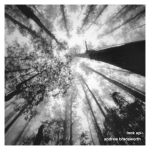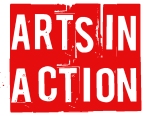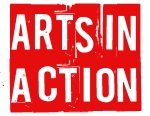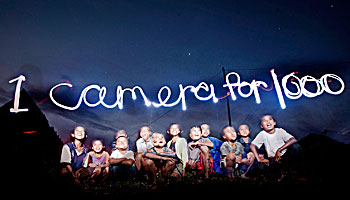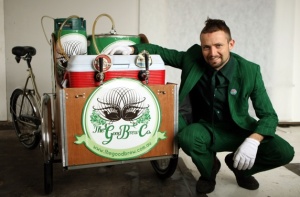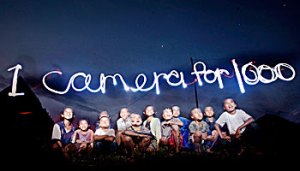
Photo by Richard Piscioneri
COLLABORATOR PROFILE: 1 Camera 1000 smiles
Event: Film Screening Manufactured Landscapes
Click here for part 1 of the interview
Angie: So what’s happening in the next phase of the project?
Richard: Now that we’ve collated some camera equipment the next phase is to assign the cameras to the kids and work out a schedule where they go and take photos. We’re now going through the process of back peddling we’re going to start off creating a new curriculum, so there’s a lot more structure. And it’s developing into something more comprehensive. Actually this whole thing is more a media project, you know it’s not just cameras, it’s media overall. The workshops with the children also turn into sort of activity days. We stop and we do some song and dance or there may be a yoga workshop that happens in between it all. Perhaps something else, some books or other kids activities and then we always incorporate the recycling venture into it. We run around the village and collect rubbish that’s around the area.
Angie: Tell us more about the environmental aspect of the project
Richard: And that’s one of the other purposes, that’s the underlying agenda here as well, is to create an environmental project alongside with the camera project. And in the end if you actually boil it down the camera project is an environmental project because it’s utilizing disused equipment, disused products and there’s so many disused products around the world particularly in places like here in Melbourne in Australia, people throw things out all the time hard rubbish, you can build an entire house if not a city on some of the things that are thrown away.
When you’re in a place like Bali or Indonesia, not even a stick is thrown out because it all gets reused. Like today I went and saw a friend who donated a box of toys to the kids which is amazing and there was another couple of boxes beside them and I go what are those for? Oh we just went through those and we didn’t think those things were good enough to give you so we’re going to take it to the tip. I go, no you don’t realise that what’s in those boxes is just as precious or just as valuable. They gladly accept anything and will utilise it. And anything that’s really no good, we’ll sift through and get rid of but there’s a vast difference between what we imagine is no good and what actually is, we have different concepts or understandings of what’s valuable and what’s not. The majority of it can be totally utilised.
And that’s one of my main things I’m just a little bit concerned about the developments that happen everywhere and how things are produced quite cheaply monetary wise but they have an impact, they’re quite expensive because they have an impact on the earth’s environment.
So we’re so accustomed now to going into stores that import a lot of goods from very cheap economies like China for example. And they’re able to produce products, you know even things like tools. Certain brand of power tools are produced quite cheaply so people would just buy these products and they’d buy them and then they throw them out and then they buy more and it all gets thrown out again, into land waste, so then it has to be remanufactured, reproduced, redelivered, reshipped, resold and rewasted.
And this is my own personal pet hate so I just want to try and do my two little bobs worth towards it, you know, just for my own personal, self satisfaction. You know if I can make my own differences to what surrounds me , then I’m happy with that. I’m not trying to change the world, the only thing I can change is myself.
Angie: What are some of the project targets?
Richard: Well the target, I guess when designing and conceptualising the whole 1 camera 1000 smiles project, was always to set up a project like this and then utilize what we learn from the initial project and then taking this idea and implementing it into other areas, other parts of the world. This could be done with cameras, it gets done with books, computers, and everything but it’s about, creating a little bit of happiness and then to taking it a little bit more worldwide. And you know, it doesn’t necessarily have to be underdeveloped regions, this project can happen right here at my own doorstep here in Australia. There are lots of groups here, that could utilize something like this, that could utilize a project of this nature. Lots of groups, ethnic groups, youth groups, and a whole host of others.
Angie: How can people contribute to the project? What’s needed and what are some of the different ways people can contribute?
Richard: How can people contribute to the project, well there’s a host of different ways. The project is quite a young project; it’s starting now, beginning to really create a firmer foundation. Primarily the way to contribute is just by people going through their old drawers and just seeing what’s in cupboards or garages and sheds, and seeing if they have any photographic equipment or media style equipment, that they want to part with, or that hasn’t been used for 5 years or 10 years or 2 years and it’s not going to be intentionally used again. And rather than collect dust we could make use of it. Most people can contribute by giving us their old disused cameras.
Other people can contribute if they really want to get involved as a volunteer. There are some roles for volunteers. We’ve got people at the moment beginning to work on creating some infrastructure to the project. As the project develops we’re going to need educators. People that want to contribute time. Money at the moment is something we don’t readily want to accept. We want to be able to self fund, but we don’t want to be a charity per se. We want to be like an NGO group where we can become a little bit self funding. We can create workshops and education programs for people who have the ability to pay and then use those funds towards the project itself.
Yoga instructors, Trekking Guides, health practitioners, photographers, teachers, flight attendance, restauranteurs, architects, hoteliers, lawyers and artists have all shared their time and inspired our local Balinese children. If you would like to share your skill sets then please complete the on line application form.
Click here to get involved in the 1 camera 1000 smiles project
Angie: So people who attend those workshops are indirectly funding the project?
Richard: Absolutely yes.
Angie: So people who have an interest in photography and want to learn from you, can attend those workshops?
Richard: Yes anyone who wants to support the project financially indirectly can attend a camera workshop and learn about different facets of photography or they can go on a photographic tour. We’d rather have something of an exchange like that than just outright collect money. Because we’re not really prepared to or in a position to be collecting people’s monies. At the moment pretty much, it’s only a couple of us doing this and we haven’t got the capacity so perhaps when things develop there may be provision for that.
Angie: What do you need to help the project move forward?
Richard: Well to do a project like this we need equipment, we need facilities, transport, we need to house it all. Transporting equipment from Australia to Bali initially is expensive and I fund it all myself. So it would be really great to get an airline company to come on board and say hey, we’re gonna give you ex amount of cargo for free. Or we’re going to be able to support you ex amount per month or per trip or whatever. Or we can give you some additional luggage or something of some nature. Or when you collect ex amount, you know maybe a transport company will come on board and say hay we’ll ship this across for you and put a small bit of cubic meter container over for you. Something of that nature. That would be invaluable to us, because things weigh a lot, everything’s by weight and at the moment I just simply pay for extra luggage on a plane and it all adds up. Also it’s not a great way of taking things across. If I had that need met I could now take over 60, 80, 100 kilos of equipment.
Once I’m over there the other thing I need is to set up a place to house it all and create the actual library itself because at the moment it’s all just at my house. I want to set up a photo library where people come and borrow the equipment. I also want to have a travelling library. Even just to build a small little trailer on a small vehicle, something of that nature where we can roll around and go from township to township on a weekly or fortnightly basis and do that. So that’s needed as well.
Since its all non profit, I’m not earning an income from it. I’m just basically working it off my own personal savings at the moment. And in the process I’m being touched and moved by the support. In fact there’s a host of equipment donated from government organisations, from the general public, and people are detaching or departing with their own personal equipment, stuff that has some sort of personal sentiment to them. Like the first camera they ever learnt on or a camera that belonged to a dear family member and so forth. And this is really touching and with this it creates a real sense of responsibility, not only to the prospective students but also to the sponsors, to everyone who supports the project.
Angie: What is it that brings a smile to your face about this project?
I just get a good sense when I’m teaching the kids. When I’m actually in amongst it all I get a really good sense for it. A really good feeling and that makes me smile. And it’s not, you know, it’s not something that I crave, it’s not something that I need, or I planned for, it’s something that I became aware of, while I was there teaching. I don’t know just being in amongst it, watching the project, participating in the actual activity of the educational side , it’s physically demanding , its mentally demanding but it’s extremely rewarding as well. And all these other aspects of it, you know, speaking about the project, creating a website, creating everything else that surrounds it is nice. But really the bigger smile comes from smiling alongside with the kids. And watching their faces light up. Energy creates energy. So when you’ve got 100 kids smiling and really happy about things it just doesn’t do anything but make you smile as well.
Also it’s very moving when we get notes attached to the cameras that are donated and like I said before it may be their first camera. They’ll leave a note saying “this camera was the first camera I ever learnt on, I hope it’s brings a lot of happiness to someone else as well, coz it’s certainly brought me a lot of happiness.” So there are little attachments like that and that really make me smile too.
TO SUPPORT THIS PROJECT PLEASE BRING ALONG YOUR OLD UNUSED CAMERAS TO THE SCREENING OF MANUFACTURED LANDSCAPES. If you can’t attend the screening but have equipment you wish to donate please contact Angie angiemuccillo@gmail.com or on 0417391055 to arrange a pick up.
 Soul Theatre is having it’s BIG LAUNCH on March 18 for its work in educating society and the politicians about the seriousness of the Climate Change Crisis and helping to provide solutions.
Soul Theatre is having it’s BIG LAUNCH on March 18 for its work in educating society and the politicians about the seriousness of the Climate Change Crisis and helping to provide solutions. 